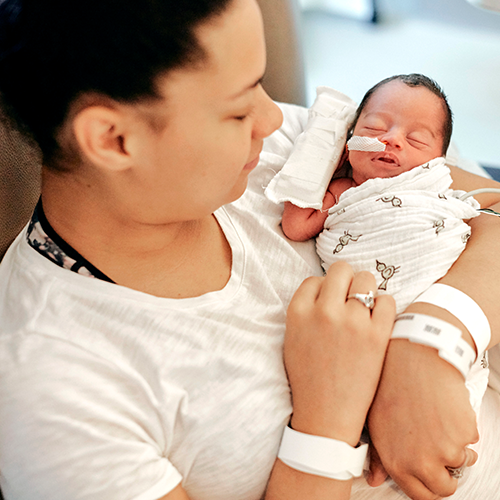The benefits of human milk for newborn babies are very important, especially for those babies born prematurely or have stays in a neonatal intensive care unit (NICU). But some new parents need support during their lactation journey – and we’re here to help.
While most babies already leave the NICUs at Children’s Minnesota on their mother’s milk, the goal is to get the numbers even higher. To do just that, Children’s Minnesota began a new initiative in December 2022 called Project HOME (Home on Milk Every Time).
The Mother Baby Center is a partnership between Allina Health and Children’s Minnesota.
Dr. Leah Jordan, neonatologist at Children’s Minnesota and one of the leaders of Project HOME at Children’s Minnesota, shares more about this initiative and how it helps neonatal patients thrive.
What is Project HOME?

The goal of Project HOME is to increase the number of babies who are breastfeeding when they go home from the Children’s Minnesota NICU. We know that breastfeeding doesn’t come easy to everyone. Through this program, our experts work to provide every family the support they need to be successful. Our team is paying particular attention to babies of color and babies who have longer hospital stays.
Since beginning the project in December 2022 and after several cycles of intervention, the Children’s Minnesota neonatal department has met its goal! Now, more than 80% of infants leave the Minneapolis NICU, special care nursery and infant care center (ICC) on human milk.
How does Project HOME promote breastfeeding equity?
“There are well documented national and local disparities in rates of human milk feeding,” said Dr. Jordan. “We wanted to make sure that our project made these disparities better, not worse.”
The neonatal team developed this project using a framework called Equity-Focused Quality Improvement, where equity has been at the core of the design, implementation and measurement processes. A few examples of how the team has prioritized equity include:
- Translating all written family education materials into the most spoken languages in our units (Spanish, Hmong, and Somali).
- Advocating for equitable access to our preferred hospital grade breast pumps.
- Providing pumping supplies to families who could not otherwise afford it.
- Standardizing what lactation education we provide to families.
How did Project HOME come about at Children’s Minnesota?
Children’s Minnesota participates in a quality improvement (QI) collaborative called the Children’s Hospitals Neonatal Consortium (CHNC). Within this CHNC, there are nearly 50 Level IV NICUs across North America working to improve care and outcomes for infants in their NICUs.
Every few years, the CHNC develops an initiative and Project HOME was the chosen one this cycle.
Why is human milk so important for babies, especially NICU babies?
The American Academy of Pediatrics (AAP) recommends an exclusive human milk diet for the first 6 months of life for all infants. There are plenty of benefits to human milk for babies like prevention and protection against diarrhea, ear infections, respiratory infections and more.
“The benefits of human milk for preterm babies are even greater,” said Dr. Jordan. Some of the benefits for babies born early include:
- Protects against life-threatening infections of the blood, lung and intestines.
- Promotes optimal development of all parts of the body, which reduces long-term complications of early birth.
- Shorter lengths of stay in the NICU.
- Decreases the number of babies needing to be readmitted to the hospital in the first year of life.
- Promotes healthier heart function and metabolism into adulthood.
- Promotes the most optimal brain development.
What are the barriers people face when breastfeeding?
“While human milk is incredibly beneficial for infants in the NICU, it also comes with unique challenges,” Dr. Jordan said.
Things like being away from your baby while they’re in the NICU, facing your own health challenges, feeling overwhelmed by the situation, the stress of your baby being sick and so much more can cause barriers to your lactation journey.
“While Project HOME can’t take those challenges away, we can equip families with the timely education, resources and empowerment needed to face these barriers and reach their goals,” said Dr. Jordan.
Partnering with you through this journey
Parents are always the experts for their unique family. Our experts know that feeding plans can change when babies are admitted to the NICU. We also know that for some families, breastfeeding may not be possible or desired due to medications, surgical history or mental health reasons.
“We look forward to partnering with your family to provide the support you need and want to help you reach your informed feeding goals,” Dr. Jordan said.